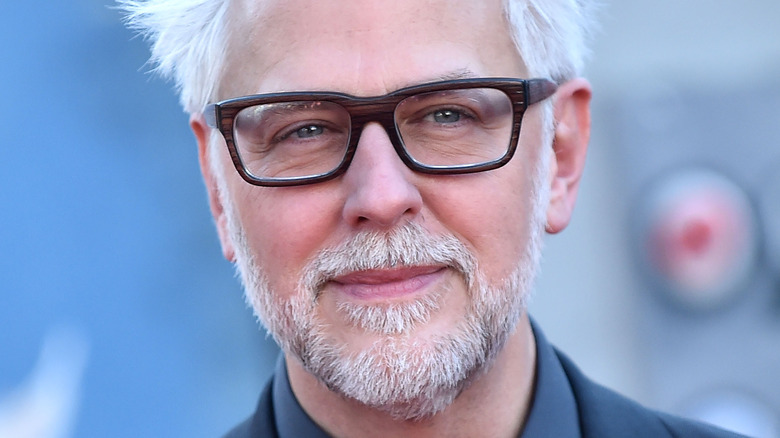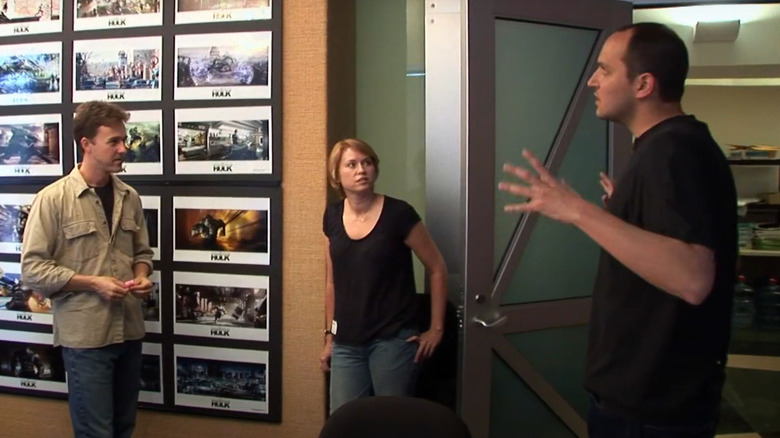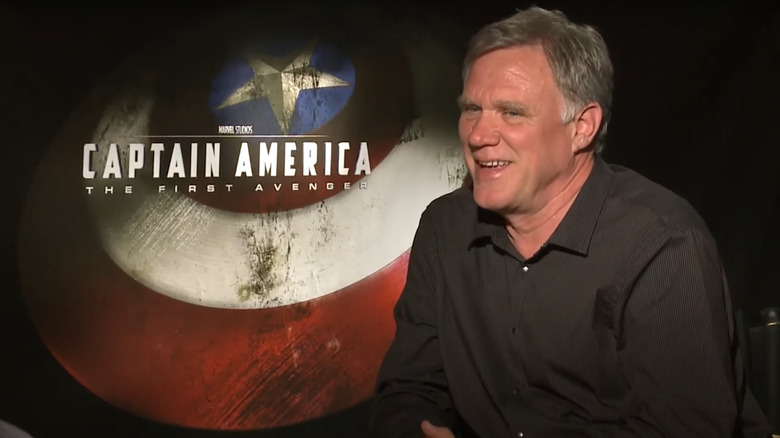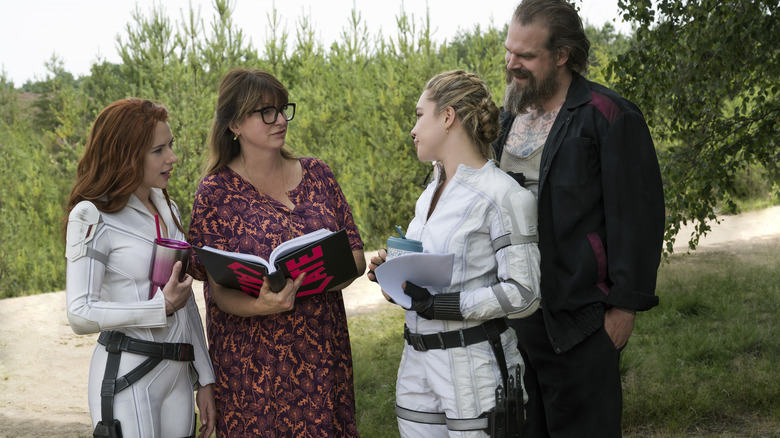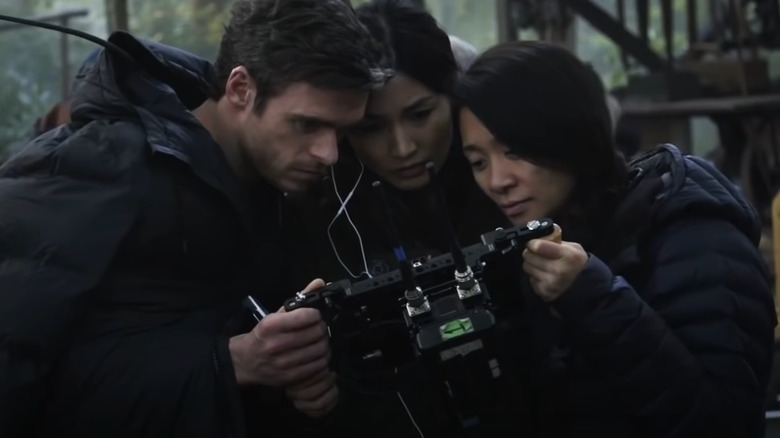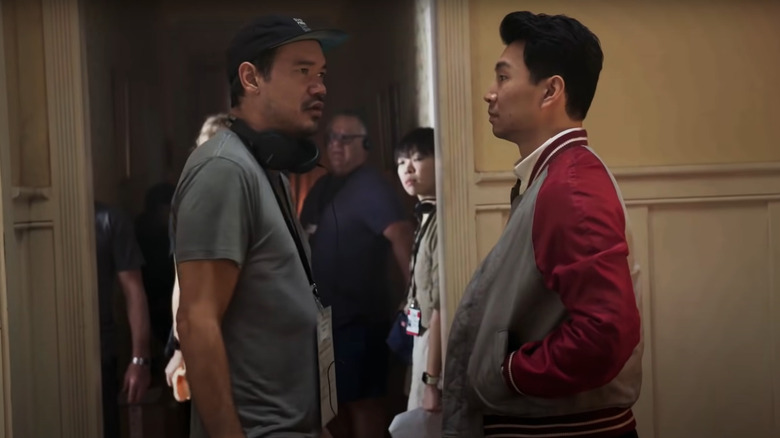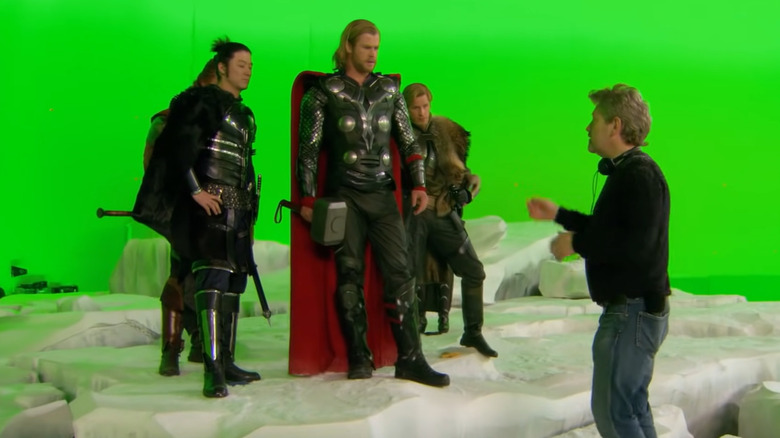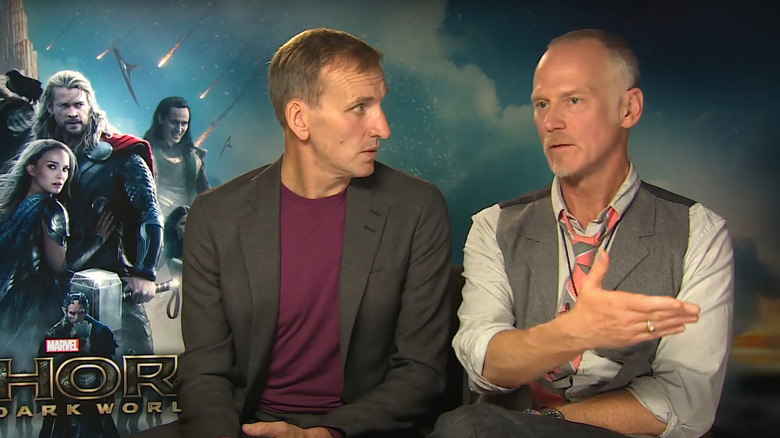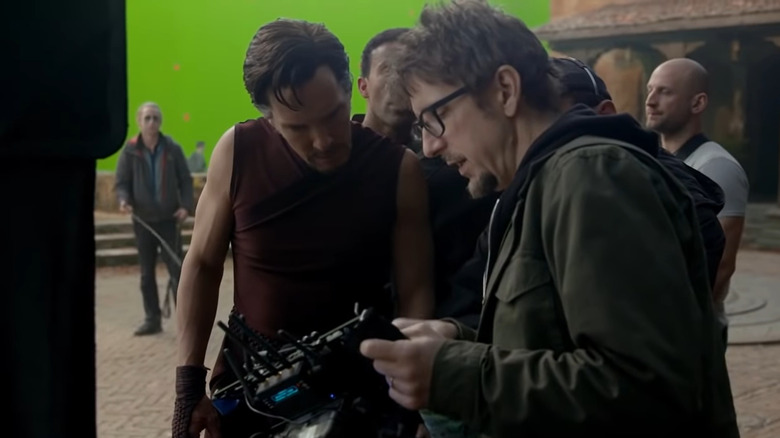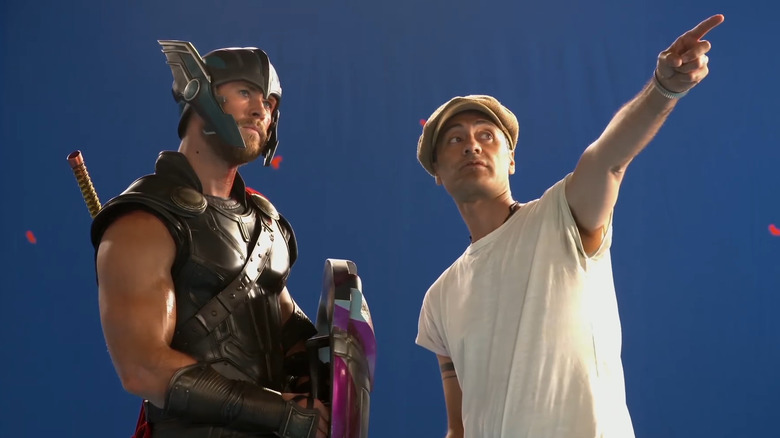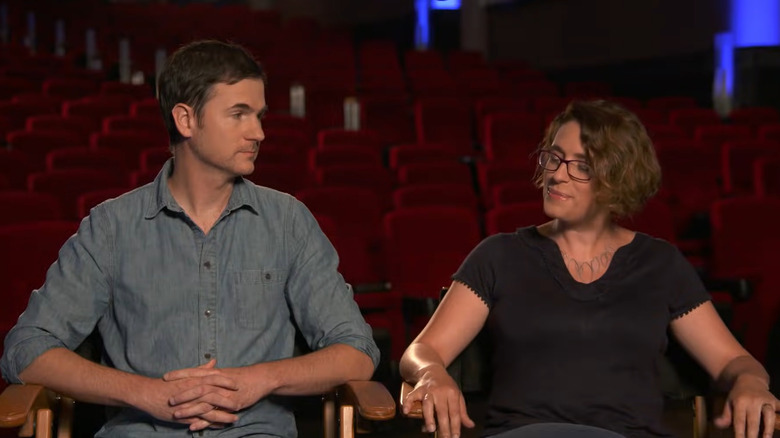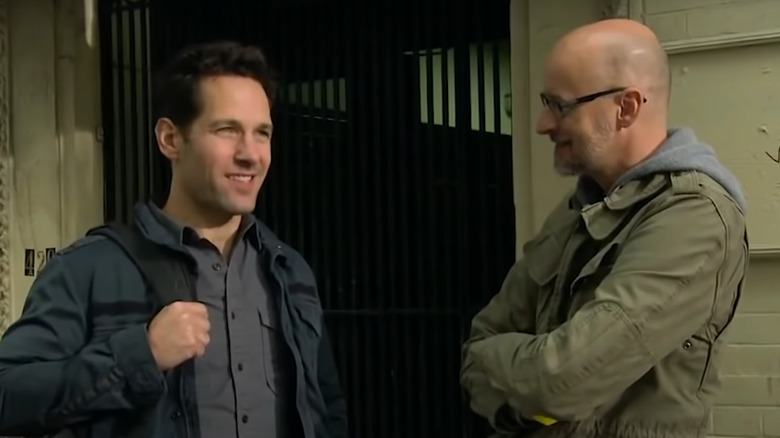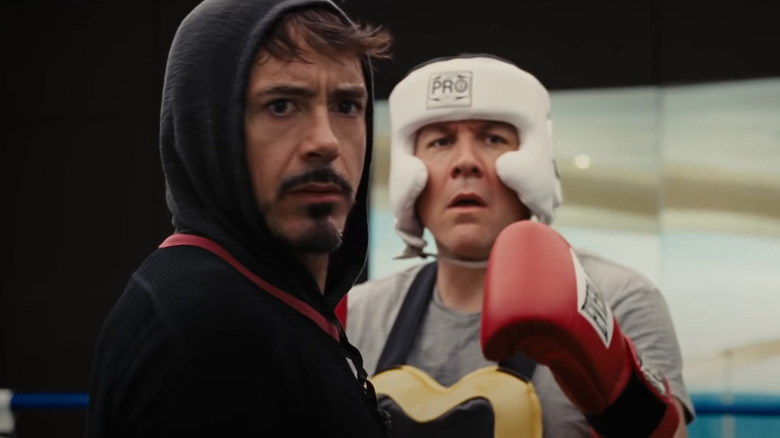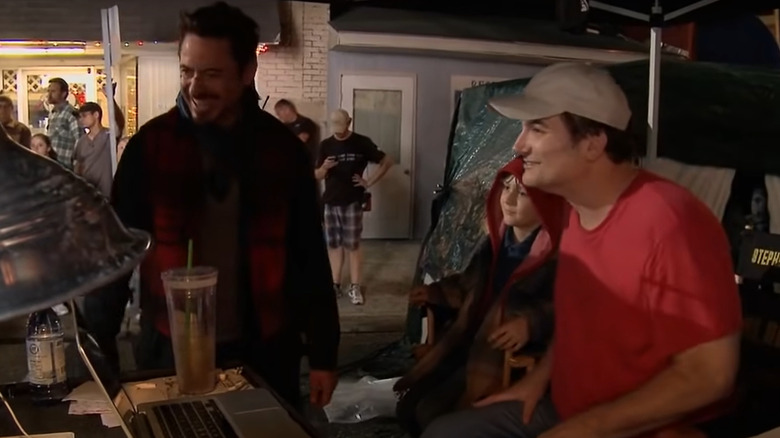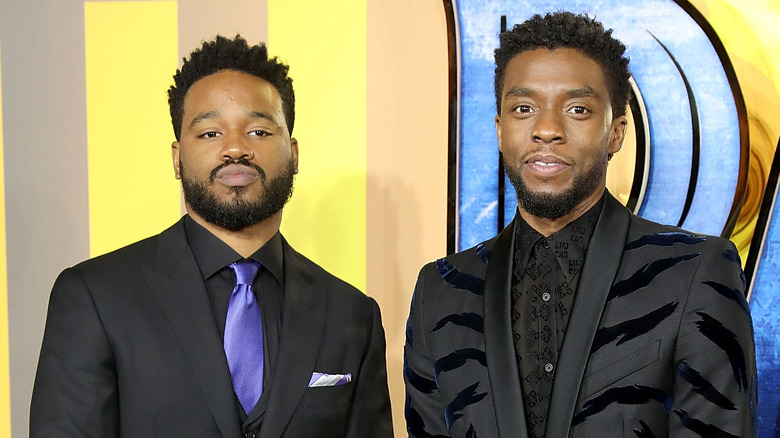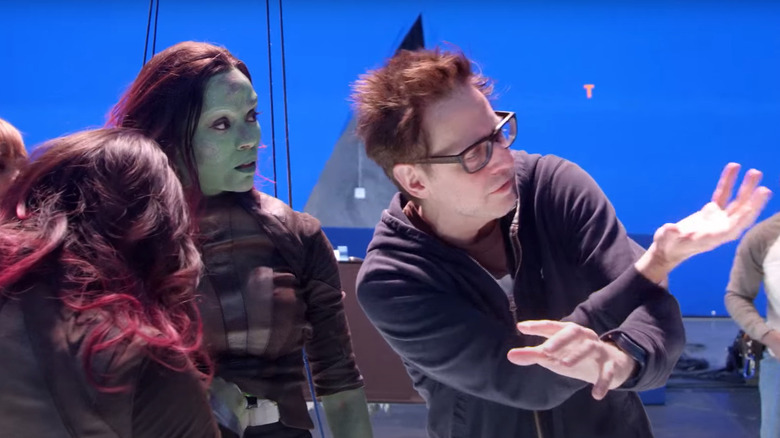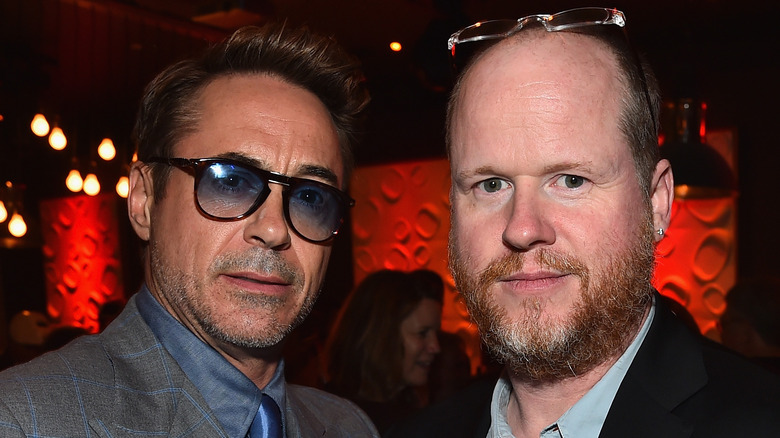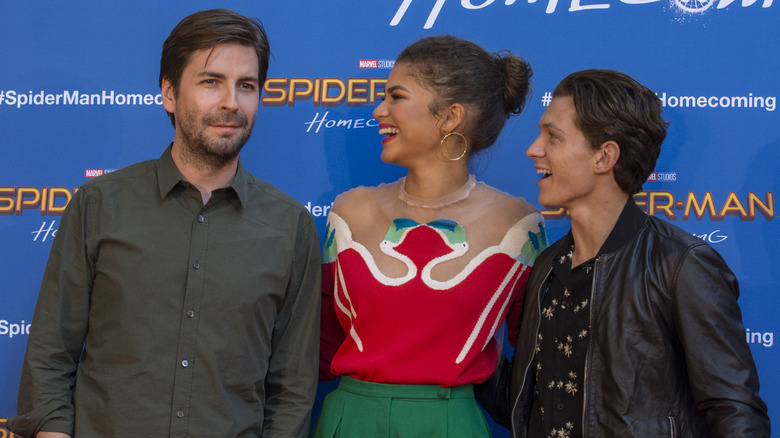Marvel Cinematic Universe Directors Ranked According To Box Office
Marvel Studios has always been, since its inception in the mid-2000s as a standalone production company, a top-down operation. Kevin Feige has always been in charge, moving up over the years from president of production to chief creative officer, while a shifting group of top executives and advisors have helped Feige guide the company and the Marvel Cinematic Universe to unprecedented heights of financial, critical and audience success.
Yet it's the structure of Marvel that has also led to some of the sharpest criticism of the studio. Some have suggested that the "Marvel house style" of filmmaking doesn't allow for individual directorial visions to shine through, instead running them through a kind of assembly line that stamps each new film with the same basic aesthetic. Certainly iconoclastic directors like Taika Waititi and James Gunn have been given free rein to pursue their creative goals, while others like Anthony and Joe Russo or Jon Watts are comfortable within the Marvel format. On the other hand, there are auteurs like Edgar Wright or Patty Jenkins who didn't see eye-to-eye with Marvel and left projects before filming even started.
They may sometimes be one of the most overlooked parts of the Marvel machine, but the directors of all the MCU features to date have still played a crucial role in bringing this colossal franchise to the screen. Yet how have they contributed to its financial bottom line? From the Russos to, uh, the guy who directed "The Incredible Hulk," let's rank the MCU directors via their entries' box office earnings.
18. Louis Leterrier
Poor Louis Leterrier and his "The Incredible Hulk." The French director had scored modest hits with his 2002 action thriller "The Transporter" and its sequel, "The Transporter 2," before Marvel Studios selected him to direct its second feature film. But while the 2008 movie did have its good points — the performances by Edward Norton as Bruce Banner and Tim Roth as Emil Blonsky among them — it also suffered from a weak script and, strangely enough, rather uninspired direction.
Because of its strange distribution situation (it's the only MCU movie released by Universal, which lost the rights to the character but retained the option to distribute his solo films), generally poor reviews, and Norton's acrimonious parting with Marvel a short time later, "The Incredible Hulk" is considered the red-headed stepchild of the MCU. Its box office reflected that as well, with the movie only earning a meager $266 million worldwide — making it possibly the only MCU movie to just miss turning a profit. That also unfortunately puts Leterrier, who bounced back with hits like "Clash of the Titans" and "Now You See Me," at the bottom of this list. His "Hulk" just wasn't a smash.
17. Joe Johnston
After launching his career with art design and visual effects work on the original "Star Wars" trilogy, as well as "Willow" and "Raiders of the Lost Ark" (for which he shared an Academy Award), Joe Johnston became the quintessential journeyman director. Able to jump from genre to genre and also take over troubled productions if needed, Johnston made his directorial debut with "Honey, I Shrunk the Kids" before helming "The Rocketeer," the original "Jumanji," "Jurassic Park III," and the horror flop "The Wolfman," which he jumped aboard just a few weeks before filming started.
Perhaps because of his experience with visual effects and period adventure films, Johnston seemed like a natural for 2011's "Captain America: The First Avenger," the Cap origin story set during World War II. The gamble worked: "Captain America" is a terrific period action piece and launching pad for the MCU's superhuman Boy Scout, and almost certainly the best of the first five MCU films after "Iron Man." With the MCU still finding its feet back then, "Captain America" grossed a respectable (and profitable) $371 million worldwide — decent enough but still far below what future Cap and Marvel movies would bring in. When it was time for Cap's second solo movie, the franchise would head in a different direction.
16. Cate Shortland
In some ways, Cate Shortland got — no pun intended — the short end of the stick. After Scarlet Johansson saw the Australian director's 2012 World War II thriller "Lore," she was impressed enough (via The Hollywood Reporter) to want Shortland calling the shots for the long-awaited and long-overdue "Black Widow," a standalone film for Natasha Romanoff that would fill in the blanks of what she was doing between "Captain America: Civil War" and "Avengers: Infinity War." The film would also introduce her successor, Yelena Belova (Florence Pugh), who would possibly take on Natasha's role with the surviving Avengers in the aftermath of her death in "Endgame."
"Black Widow" was a gripping enough Marvel adventure with a decidedly fresh female-centric viewpoint, yet it suffered from the same problem as all prequels: We know where the story is going so there's very little suspense. But what hit "Black Widow" the hardest was COVID. Originally slated to kick off the MCU's Phase 4 in May 2020, the film's release was moved three times before it finally came out in July 2021 — simultaneously in theaters and as a premium rental on Disney+. In the end, "Black Widow" grossed nearly $380 million worldwide — the lowest Marvel tally in years but difficult to call a failure given the circumstances — and at least $60 million in streaming revenue. How might it have done if the world hadn't shut down? Not even Natasha herself could solve that.
15. Chloe Zhao
It's been said that Marvel likes to find cutting-edge directors for its films, only to sand off anything that makes those directors unique once they get behind the camera. The studio couldn't have found a more buzzing talent than Chloé Zhao, who went from critical acclaim for her indie features "Songs My Brother Taught Me" and "The Rider" to becoming only the second female director in history to win the Oscar for Best Director with "Nomadland." So it was exciting — if a little perplexing — when Marvel announced Zhao as the director of "Eternals," a massive epic introducing one of the more obscure groups of characters in Marvel's vast canon.
"Eternals" faced several headwinds when it came out in November 2021. The world was still climbing out of the worst of the COVID-19 pandemic, the property itself was unfamiliar even to a lot of diehard Marvel fans, and the film endured the worst critical drubbing in the history of the MCU. Many pointed out that Zhao's intimate, semi-documentary style of filmmaking clashed awkwardly with Marvel's CG-driven action beats and quip-laden dialogue. In any case, "Eternals" managed to scrape up $402 million worldwide during its run — again, not bad in the age of COVID but not necessarily enough to warrant making "Eternals 2" or bringing back Zhao to helm it.
14. Destin Daniel Cretton
Out of the three features that Marvel released in 2021 (not counting "Spider-Man: No Way Home," which was produced by Marvel but distributed through Sony), "Shang-Chi and the Legend of the Ten Rings" yielded the best box office results both domestically and worldwide, with nearly $225 million in the coffers for the former and a global total of $432 million. All the COVID-related disclaimers again apply, but "Shang-Chi," with its homage to the martial arts genre and a fresh yet relatable hero, perhaps played more to Marvel's strengths than the looking-backward "Black Widow" or the esoteric "Eternals."
Director Destin Daniel Cretton, of Japanese-American descent, set out to make a film explicitly devoted to the exploration of Asian culture and themes, working with Chinese-American screenwriter Dave Callaham and an outstanding cast that mixed newcomers like Liu and Meng'er Zhang with legends of Asian film such as Tony Leung and Michelle Yeoh. The results were successful enough with both critics and audiences for Marvel and Cretton to begin developing a sequel — with Cretton and Shang-Chi potentially both having important roles in the future of the MCU.
13. Kenneth Branagh
At the time of its release in 2011, "Thor" was the biggest risk that the Marvel Cinematic Universe had taken. While the two "Iron Man" movies and "The Incredible Hulk" were sci-fi features that nevertheless stayed firmly on Earth, "Thor" set out to introduce audiences to the titular fantasy hero and his fellow Asgardians — beings from another plane of existence, mistaken by early humans as gods — as well as an entirely new space-based realm of other worlds and alien races.
We suspect that Kenneth Branagh was hired to direct more for his Shakespearean bona fides than his (non-)expertise at space opera. Despite its rainbow bridges, golden cities, and cosmic battles, "Thor" at its heart was a tragedy about two brothers vying for their kingly father's affection with disastrous consequences. Not all of it worked (like the chemistry between Chris Hemsworth and Natalie Portman), but Branagh skillfully managed to weave together the family melodrama and the comic book shenanigans in a way that didn't embarrass the studio or reduce the God of Thunder to a punchline. Thor would ascend to greater heights in the MCU, while Branagh would not, but their movie's $449 million worldwide take was worthy enough for its time.
12. Alan Taylor
Believe it or not, Alan Taylor's "Thor: The Dark World" earned almost $645 million at the global box office, with $206 million of that piling up in North America. The worldwide total is nearly $200 million more than the original "Thor," perhaps proving that turning up in the first "Avengers" movie the year before was a smart promotional move on the part of the Prince of Asgard when it came to pushing his 2013 sophomore solo outing.
What makes this so strange is that nobody really likes "The Dark World." Critics weren't particularly kind, while fans regularly place it at or near the bottom of any ranking of MCU movies. Most notably, it doesn't seem like Alan Taylor cares much for it either. The "Game of Thrones" director boarded the project after Patty Jenkins exited, only to later tell The Hollywood Reporter that his vision of the movie was considerably compromised by the studio. Taylor didn't have much luck with his next two franchises either, directing the much-hated "Terminator Genisys" and the lukewarm "Sopranos" prequel "The Many Saints of Newark."
11. Scott Derrickson
With several of Scott Derrickson's previous films — like "The Exorcism of Emily Rose," "Sinister" and "Deliver Us from Evil" — focused on the supernatural, it made sense for him to join the MCU for the inaugural appearance of Doctor Strange. While the film played almost as a rewrite of the first "Iron Man" and Tony Stark's origin story — only couched in mystical, metaphysical terms instead of high-tech military ones — there were enough flourishes added, especially when it came to bending time and reality in classic Steve Ditko fashion to make this a fairly satisfying debut for the Sorcerer Supreme.
Audiences seemed to think so too, and Derrickson's 2016 contribution to the MCU racked up a healthy $676 million worldwide — not mind-blowing at this stage of the Marvel game (it followed the billion-earning "Captain America: Civil War"), but good enough for a character whose biggest fans probably last read his exploits while tripping on LSD in college in 1967. Although Derrickson did initially sign up for the sequel, he and Marvel parted ways fairly early in the process over the time-honored creative differences, paving the way for Sam Raimi to take over "Doctor Strange in the Multiverse of Madness."
10. Taika Waititi
Following "Thor" and "Thor: The Dark World," the God of Thunder was at a crossroads. Neither of his two solo films had been particularly well-liked, and although he played well as a member of the Avengers, it seemed as if some sort of reinvention was in order. Enter Taika Waititi, the New Zealand director of "What We Do in the Shadows" and "Hunt for the Wilderpeople," who brought his own eccentric sense of absurd humor and a completely different visual style to the "Thor" franchise.
Both Waititi and star Chris Hemsworth wanted to inject more comedy into the proceedings (via EW) following the dour "The Dark World," and the result was 2017's "Thor: Ragnarok." The film introduced out-there Marvel characters like Hela, Surtur, and the Grandmaster (not to mention Korg, played by Waititi himself), blended the Hulk and (briefly) Doctor Strange into the mix, and stirred it all into a heady adventure that captured a lot of the crazy energy from classic "Thor" comic book runs that had been missing in the movies. The film's $854 million worldwide gross proved that Waititi was onto something, with the director invited back for 2022's "Thor: Love and Thunder" — an unprecedented fourth solo outing for a Marvel superhero.
9. Anna Boden and Ryan Fleck
The directing duo of Anna Boden and Ryan Fleck may be among the most surprising members of Marvel's billion-dollar club, if only because their sole contribution to the MCU, "Captain Marvel," doesn't feature any particular stylistic trademarks or embellishments that mark it as the work of the pair, who were previously known for indie features like "Half Nelson" and "Mississippi Grind." Instead, if there's been one consistent criticism leveled at Brie Larson's debut as the super-powered human/Kree hybrid Carol Danvers, it's that it feels a lot like a generic Marvel origin story — albeit the first for a female MCU hero.
That groundbreaking fact alone, along with some excellent space opera moments and a great cast that saw Larson supported by Samuel L. Jackson, Ben Mendelsohn, Jude Law, Annette Bening and Lashana Lynch probably helped push 2019's "Captain Marvel" past the $1.1 billion mark at theaters around the world (this also despite the efforts of toxic fans to dampen enthusiasm for the picture). While Boden and Fleck didn't return for the sequel, "The Marvels," The Hollywood Reporter suggested a while back that they were in talks to work on a Disney+ series — although nothing further has been heard on that front.
8. Peyton Reed
The two "Ant-Man" movies to date are considered among the smallest (no pun intended) of the MCU, in that they're almost completely self-contained, relatively low-stakes adventures with little bearing upon the wider narrative (although that did change somewhat with Scott Lang's discovery of the Quantum Realm's time-bending properties in "Avengers: Endgame"). The character himself — either the Lang or Hank Pym iteration — wasn't generally known to the public outside longtime Marvel Comics readers, although an "Ant-Man" movie had been in the works since the earliest days of the MCU.
Both 2015's "Ant-Man" and 2018's "Ant-Man and the Wasp" were relatively modest performers for Marvel, with the former earning $519 million worldwide and the latter raking in $623 million. That makes for a grand total of $1,142,000 combined, which pushes both the property and two-time director Peyton Reed into Marvel's billion-dollar circle. Reed delivered breezy, family-friendly comedies both times out, and star Paul Rudd has established himself as one of the MCU's most appealing superheroes. Both Reed and Rudd are back for "Ant-Man and the Wasp: Quantumania," which might break out — with its official introduction of big bad Kang the Conqueror — as the most significant yet of the trilogy.
7. Jon Favreau
Although he had experience with visual effects, fantasy, and sci-fi adventure thanks to two of his three previous directorial efforts ("Elf" and "Zathura: A Space Adventure"), Jon Favreau seemed like a surprising choice to helm the first official offering of the Marvel Cinematic Universe, 2008's "Iron Man." But Favreau had a vision for the film and the character, a vision that also began with the man he wanted for the role: Robert Downey Jr. Although Marvel was initially hesitant (via Forbes) to cast the long-troubled Downey, Favreau was insistent — and thus movie history was made.
"Iron Man" earned terrific reviews — particularly for Downey's performance — and $586 million around the globe, silencing the naysayers and beginning the triumphant ongoing run of the MCU. "Iron Man 2" followed two years later, adding $624 million to the Marvel coffers for a total of $1.2 billion under Favreau's direction. Although he didn't helm "Iron Man 3," he's continued to appear in the MCU as Happy Hogan and serve as an executive producer on the "Avengers" films while going on to directing triumphs with the "Jungle Book" and "Lion King" remakes and co-creating "The Mandalorian." But his critical role in launching the MCU marks him as one of its key filmmakers to this day.
6. Shane Black
It may seem strange, but 2013's "Iron Man 3" grossed just a hair more than both previous "Iron Man" pictures combined, finding $1.2 billion around the world to nudge it just above the first two entries in the Tony Stark trilogy. While the Iron Man character on his own was already a proven box office commodity, the jaw-dropping success of "The Avengers" the year before was a rising tide that lifted all the Marvel boats, as evidenced by not just the success of "Iron Man 3" but "Thor: The Dark World" and "Captain America: The Winter Soldier."
"Iron Man 3" was directed and co-written by Shane Black, who'd put Robert Downey Jr. on the comeback road (via The Hollywood Reporter) with 2005's "Kiss Kiss Bang Bang." Black introduced some of his trademarks — a Christmas setting, a buddy-cop structure, and a crime mystery narrative — into the superhero film, which stayed firmly on the ground with high-tech human villains following the more cosmic-in-scope "Avengers." With Tony spending less time in the suit and the surprise Mandarin reveal, "Iron Man 3" was fairly divisive among the fans, but Black managed to put his personal stamp on his one and only MCU offering.
5. Ryan Coogler
Ryan Coogler has completed just one film so far for Marvel Studios, but what a film it was. 2018's "Black Panther" was historic in so many ways, from its mostly Black cast and crew to its stunning aesthetic combining Afro-futurism with African history to its staggering box office and groundbreaking nomination for a Best Picture Oscar. It changed the course of cinema, made a superstar (all too briefly, unfortunately) out of Chadwick Boseman, and opened up even more vistas for the MCU itself.
"Black Panther" took in more than $1.3 billion around the world, including an earthshaking $700 million in the U.S. alone, with Coogler coming back to not just direct and co-write the sequel, "Black Panther: Wakanda Forever," but also to develop a Disney+ series set in the high-tech nation. Of course, the loss of Chadwick Boseman has turned the plot of "Wakanda Forever" into one of the biggest mysteries of the MCU, with Coogler and Marvel facing other challenges as well. But Wakanda is nothing if not rich in storytelling opportunities, and Coogler is the man destined to deliver them.
4. James Gunn
As with Jon Favreau and the Russo brothers before him, James Gunn seemed like a left-field choice to direct a big-budget Marvel tentpole. While known for screenplays like "Scooby-Doo" and the 2004 remake of "Dawn of the Dead," the Troma Entertainment alumnus had just two movies under his belt as a director — the slimy horror spoof "Slither" and the raunchy, dark-humored superhero takedown "Super," which combined cost about one-tenth of the budget for Gunn's Marvel debut, 2014's "Guardians of the Galaxy." And who the heck were the Guardians of the Galaxy anyway?
Even if you weren't familiar with one of Marvel's most obscure teams, Gunn's distinct, quirky style and unbound imagination helped turn them into one the MCU's most endearing properties. The first "Guardians" movie grossed more than $773 million worldwide, while 2017's "Guardians of the Galaxy Vol. 2" roared past that with a final tally of $864 million. Gunn's personal stamp on the material was important enough that he was consulted for the Guardians' scenes in "Avengers: Infinity War." While his relationship with Marvel parent company Disney briefly hit the skids when the company fired him over some old, tasteless jokes on Twitter, the Mouse House came to its senses a short time later and hired him back for "Guardians Vol. 3," which arrives in 2023. No doubt the final chapter of Gunn's off-kilter trilogy will add considerably more to the $1.6 billion he's already made for Marvel.
3. Joss Whedon
Thanks to one controversy after another surrounding Joss Whedon, we're faced with one of those increasingly frequent conundrums where fans have to decide whether they can separate from the art from the artist. But there's simply no question that, when handed the biggest gamble of the early Marvel Cinematic Universe — weaving together one gigantic crossover adventure featuring the stars of five different previous films — he delivered in spectacular fashion.
Nothing like 2012's "The Avengers," which Whedon directed and (mostly) wrote, had ever been attempted before, and somehow — despite directing just one previous feature film, "Serenity" — he made it all work. The film unified the Marvel Cinematic Universe into a largely cohesive whole while celebrating 50 years of Earth's Mightiest Heroes, all with plenty of wit, action, humanity and excitement. The public responded beyond Marvel's wildest dreams, with the movie earning a then-record setting $207 million in its opening weekend and making more than $1.5 billion across its entire global theatrical run. Whedon's 2015 follow-up, "Avengers: Age of Ultron," took in slightly less with $1.4 billion, but their combined total of more than $2.9 billion puts Whedon in the MCU directors' top ranks.
2. Jon Watts
Is it any wonder that Marvel Studios wants to be in the Jon Watts business? Seemingly coming out of nowhere with just two indie features to his name (including the quite effective "Cop Car"), Watts directed 2017's "Spider-Man: Homecoming," Tom Holland's first standalone film as Spider-Man and the first joint production between Marvel and Sony Pictures. The movie earned more than $880 million around the globe, better than any previous Spider-film except for "Spider-Man 3." Watts returned for 2019's "Spider-Man: Far from Home" and 2021's "Spider-Man: No Way Home," shattering previous box office records for the franchise and, with the latter film, notching the third highest-grossing movie of all time in North America and the sixth highest worldwide.
As of this writing, Watts has generated $3.9 billion in total box office with his three "Spider-Man" outings. While they are technically Sony Pictures releases, the movies fit the style, tone, and narrative format of the MCU seamlessly, which is why Watts and Marvel seem to have forged a good partnership — so good, in fact, that Marvel is going to entrust "Fantastic Four" to the director. This will be the fourth attempt at putting the First Family of Marvel onscreen. Marvel has to wipe away the bad memories of the previous three iterations (one unreleased, two produced by Fox) and create the definitive version of this seminal property. Marvel appears to believe that Jon Watts is the man who can do just that.
1. Anthony and Joe Russo
Who would've thought that two brothers from Cleveland, best known for directing episodes of "Arrested Development" and "Community," would shepherd two of the biggest movies of all time into existence while also helming two more of the most important films in the Marvel canon? When Anthony and Joe Russo were hired to initially direct "Captain America: The Winter Soldier" a decade ago, the news was met with a certain degree of bafflement. TV directors handling one of the MCU's most eagerly awaited storylines? Really?
Yes, really. The Russos had a take on "The Winter Soldier" that the Marvel brass liked, turning it into a political conspiracy thriller that amped up the dramatic potential of Marvel's output and established Chris Evans' Cap as the heart and soul of the MCU. The Russos returned for 2016's "Captain America: Civil War," raising the stakes and creating what was essentially "Avengers 2.5." So when Joss Whedon and Marvel parted ways after "Age of Ultron," the studio handed its two-part grand finale to the "Infinity Saga" — "Avengers: Infinity War" and "Avengers: Endgame" — to the Russo boys.
Not only did the two films bring nearly every major MCU character into the battle against Thanos, but they wrapped up a 10-year, 22-film cycle with grace, spectacle, and emotion. They also became two of the top five highest-grossing movies of all time, with "Endgame" briefly assuming the top spot. The Russos have directed $6.7 billion worth of Marvel movies, accounting for roughly 25% of the MCU's total $26 billion since 2008. If they ever want to return and make another project, we suspect that Marvel would welcome them back with an open checkbook.
